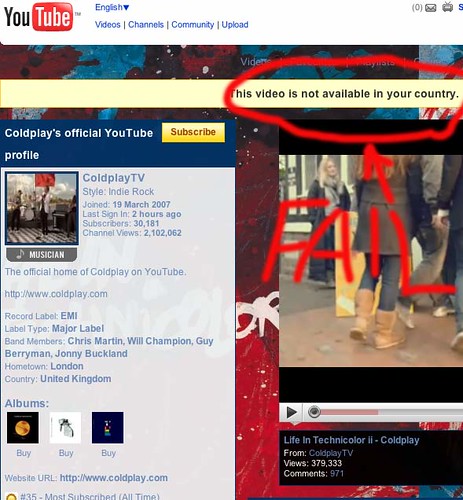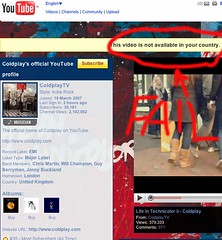
 One of the biggest “music on the web” stories in recent months has been the breakdown in relationship between the UK Performing Right Society (PRS) and Youtube (owned by Google). It’s over the share of Google’s ad revenue that should go to the writers of the songs in ‘premium content’ videos on Youtube. (for some background, here’s An article from The Guardian, and the PRS’s latest statement).
One of the biggest “music on the web” stories in recent months has been the breakdown in relationship between the UK Performing Right Society (PRS) and Youtube (owned by Google). It’s over the share of Google’s ad revenue that should go to the writers of the songs in ‘premium content’ videos on Youtube. (for some background, here’s An article from The Guardian, and the PRS’s latest statement).
So, who’s in the wrong? Not surprisingly, both are, at least partly.
Youtube don’t want to share ad revenue in any volume with anyone, if they can help it. The existence of ‘premium content’ channels says that they aren’t willing to even think about ways of paying out on EVERYTHING that’s currently in copyright. Their argument would probably be that
- most of the stuff on there is ‘non-copyright’ (though I think the copyright status of home movies could probably be contested)
- it’d be impossible to police.
The PRS, on the other hand, like the bastions of old media thinking that they are, are pushing for ever higher royalty rates for online usage. With, it seems, precious little room for individual negotiation (believing that they either do all the negotiating or non of it), but also apparently not much of an understanding of how the web changes the game completely for musicians.
(The liberal use of terms like ‘apparently’ and ‘probably’ here is because Google slapped an NDA on the first round of talks with the PRS, so no-one knows the terms of the initial agreement anyway!)
So that’s the background. What’s wrong with this picture?
Firstly, there’s the assumption that having the videos not available is somehow better than having them available for ‘free’… Videos are promotional. they are a loss-leader. Precious few music videos ever recoup the money in their own terms. They’re as much a part of a brand campaign as the adverts are. So why the assumption that they should be making money as though they were on the radio?
Bottom line for musicians is, we’d rather have people watching us than not. Yes, it’s great to get paid. But Youtube, at the moment, is a marketing platform for most of us. I put videos up there because I want the exposure, I want more content out there and (crucially) I don’t want to pay for bandwidth. There are lots of great video hosting sites (like Vimeo), but Youtube currently also has MASSIVE traffic in its favour – if I tag things well, and manage to get them listed alongside videos by other people of similar interest, it can work as part of a marketing campaign, to reach people who’ve not heard me before. That’s good.
Having said that, if google are making ad revenue off MY traffic, there should be a split. Fair’s fair.
Why the Premium Channels Don’t Work.
the problem with the premium content channel model is that it’s yet another crappy internet walled garden that requires you to:
- upload your own content
- meet Google’s standards for the nature of that content.
Which is:
- balls
I watch very little ‘premium content’ on youtube. I do however watch a lot of ‘official videos, unofficially uploaded’. They are completely outside the terms of this current load of negotiation. Why? because they aren’t indexed in any way that can be measured for ad sharing. They’re uploaded by “Tony32xLiplll” and “ShazzaFunk45” and their compatriots, who taped them off the TV, or downloaded them off bit-torrent.
The PRS have completely missed the point by focussing on the ‘official’ end of Youtube. It’s a tiny amount of the traffic, and yet again separates musicians into the ‘haves and have-nots’.
So what’s the answer?
Well, one option would be User-inputted, wiki-style publishing information for ALL videos on Youtube.
How would that work?
Well, next to the video, when you upload it, is a drop-down list to select the kind of video it is, tick whether it contains music (or film clips), and write in who wrote the song and the publisher. The boxes would autocomplete to a degree, to try and standardise the publishing data, and the PRS (and other global music collection agencies) would provide the database for the provision of the auto-complete side. Once the data was in, it would serve as search tags as well, and could be edited, wiki-style, by people who need to correct it. No money is paid out immediately – to prevent people trying to game it by putting in their details for every video – and when a song is listed, people can then do the ‘thumbs up/thumbs down’ button click to confirm what the song is (sidenote – last.fm already have this, so you could even link their data in here, if they were open to sharing the videos that have been ‘confirmed’ as being of a particular song).
What good would this do?
well, firstly, it would provide a way for people to upload copyright material to youtube, but for the originators and writers to get paid. It would also provide an incentive to musicians to do cover versions, knowing that the original artists were now LEGALLY going to get paid for the work (at the moment there is no legal way of uploading a cover version to youtube. At all! Everyone does it, because any artist or publisher with 5 brain cells knows that it’s great publicity for the original, but I’d LOVE for the people whose tunes I’ve covered on youtube to get their share of the ad revenue for them being there. I don’t need it, as I’m getting the promotional benefit of it being there.) So it would encourage community moderation (God-knows something has to try and bring some kind of community behaviour to youtube – youtube comments are for the most part the collective writings of the world’s genetic detritus.) it would result in lots of songwriters collecting loads of micropayments for their songs, it’s sustainable and it provides a way for cover versions to get out there without breaching copyright law or having to go through prohibitive release mechanisms for them to exist. Win-win.
What could go wrong?
Well, it would require some mechanism/moderation for videos that are just someone else’s song turned into an advert for a product (or rebranded to a company) – something which happens now, but with little success in the moderation department – someone couldn’t just take my song, put in my details, and add a McDonalds advert to it – there would need to be some way of the artist’s OKing commercial usage in that way.
But remember, that’s already happening. A lot. Illegally. On Youtube.
Youtube, as it stands, benefits no-one – the cost of running it is only just about offset by the money that Google are currently making in ad revenue (or so they say) – it’s a massive sprawling branding exercise for Google, but it’s basically the public face of the Torrent world. millions upon millions of videos and songs and TV shows and comedy DVDs ripped and uploaded.
The “wiki-fied publishing data” idea would not only provide the mechanism for payment, it would create a window into that kind of self-moderation that Youtube is currently severely lacking. Last.fm have all kinds of moderation and flagging tools in place. Wikipedia is obviously self-governing. A mash-up of the two, with some clever web design and a database of songs, songwriters and publishing details could result in many more people making money on a lot more videos.
What do you think?
